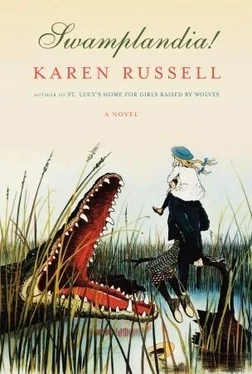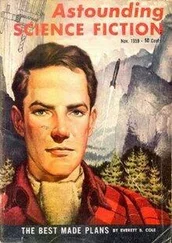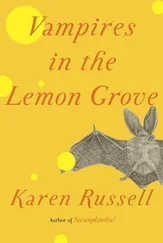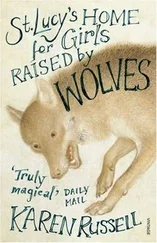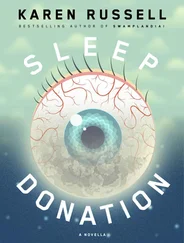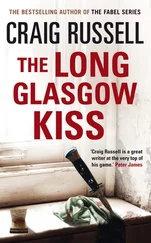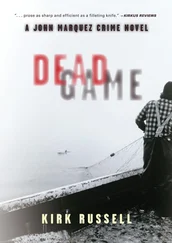We had one mammal, Judy Garland, a small, balding Florida brown bear who had been rescued as a cub by my grandparents, back when bears still roamed the pinewoods of the northern swamp. Judy Garland’s fur looked like a scorched rug — my brother said she had ursine alopecia. She could do a trick, sort of: the Chief had trained her to nod along to “Somewhere Over the Rainbow.” Everybody, without exception, hated this trick. Her Oz-nods terrified small children and shocked their parents. “Somebody, help! This bear is having a seizure!” the park guests would cry — the bear had bad rhythm — but we had to keep her, said the Chief. The bear was family .
Our park had an advertising campaign that was on par with the best of the aqua-slide attractions and the miniature golf courses; we had the cheapest beer in a three-county radius; and we had wrestling shows 365 days a year, rain or shine, no federal holidays, no Christian or pagan interruptions. We Bigtrees had our problems, too, of course, like anybody — Swamplandia! had been under siege from several enemy forces, natural and corporate, for most of my short lifetime. We islanders worried about the menace of the melaleuca woods — the melaleuca, or paperbark tree, was an exotic invasive species that was draining huge tracts of our swamp to the northeast. And everybody had one eye on the sly encroachment of the suburbs and Big Sugar in the south. But it always seemed to me like my family was winning. We had never been defeated by the Seths. Every Saturday evening (and most weeknights!) of our childhoods, our mom performed the Swimming with the Seths act and she always won. For a thousand shows, we watched our mother sink into black water, rise. For a thousand nights, we watched the green diving board quaking in air, in the bright wake of her.
And then our mom got sick, sicker than a person should ever be allowed to get. I was twelve when she got her diagnosis and I was furious. There is no justice and no logic , the cancer doctors cooed around me; I don’t remember the exact words they used, but I could not decode a note of hope. One of the nurses brought me chocolate duds from the vending machine that stuck in my throat. These doctors were always stooping to talk to us, or so it seemed to me, like every doctor on her ward was a giant, seven or eight feet tall. Mom fell through the last stages of her cancer at a frightening speed. She no longer resembled our mother. Her head got soft and bald like a baby’s head. We had to watch her sink into her own face. One night she dove and she didn’t come back. Air cloaked the hole that she left and it didn’t once tremble, no bubbles, it seemed she really wasn’t going to surface. Hilola Jane Bigtree, world-class alligator wrestler, terrible cook, mother of three, died in a dryland hospital bed in West Davey on an overcast Wednesday, March 10, at 3:12 p.m.
The Beginning of the End can feel a lot like the middle when you are living in it. When I was a kid I couldn’t see any of these ridges. It was only after Swamplandia!’s fall that time folded into a story with a beginning, a middle, and an ending. If you’re short on time, that would be the two-word version of our story: we fell .
I was thirteen years old when the end of Swamplandia! began in earnest, although at first I was oblivious of the dangers we now faced — Mom was dead, so I thought the worst had already happened to us. I didn’t realize that one tragedy can beget another, and another — bright-eyed disasters flooding out of a death hole like bats out of a cave. Nine months had gone by since Mom’s passing. The Chief had not done anything to alert the tourists, beyond a small obituary that ran in the Loomis Register . Her name was still listed in every Florida guidebook, her face was on our billboards and gift store merchandise, her Swimming with the Seths act was just about synonymous with Swamplandia! itself. Hilola Bigtree was the lodestar that pulled our visored, sweaty visitors across the water. So then I had to break some pretty bad news:
“We lost our headliner,” I told them, gesturing vaguely, as if Hilola Bigtree were of no specific relation to me. But not to worry, I was quick to assure them—“I’m Ava Bigtree, I’m her understudy, so you’ll still get to see a world-class alligator-wrestling show …”
The tourists would frown down at me, or briefly touch my shoulders.
“That man over there, in the feathers? He said the wrestler was your mother?”
I held very still. I shut my eyes as whole shuddering flocks of hands descended. Wings brushed the damp hair off my cheeks. When some other kid’s mother asked me how I was doing, I’d say, “Well, ma’am, the show must go on.” I’d overheard Kiwi saying this to a group of mainland teenagers in a tone like flicked ash. If a tourist knelt to hug me, I’d try to smile. “Be kind to the kind people, Ava,” the Chief said. “They are going to want to talk to you about her.”
But you know what? No one really did. Not after I told them what had killed her. I think they were hoping to hear that Hilola Bigtree had been attacked by her gators. They were after a hot little stir — bones crushed, fangs closed around a throat, and an unlucky vent of blood. It was interesting to watch the tourists’ reactions when I said the words “ovarian cancer.” Cancer was banal enough that they were forced to adjust their response.
“Cancer? How awful! How old was she?”
“Thirty-six.”
The tourist ladies said, “Oh!” or “I’m sorry, ” and squeezed me harder. Most of the husbands drew back a few steps: cancer, I could tell, did not impress these guys in the least.
Most tourists sat through the show after we announced Hilola Bigtree’s death, but a few asked for their money back. Those who had traveled the shortest distances always seemed for some reason to be the angriest, the Loomis bingo and jai alai set — these ladies behaved as if our mother’s death had somehow cheated them . “This was our Tuesday outing!” these blue-haired women whined. They had paid good money to see Hilola Bigtree do her Swimming with the Seths act; they didn’t take a forty-minute ferry ride to eat corn dogs with some big lizards and some extremely sorry-looking children!
Death was just another kind of weather to these ancients, the Chief explained to me and my sister. As ordinary as a rain delay. “If they make a big stink, girls, you comp their Gator Tots.”
I came to hate the complainers, with their dry and crumbly lipsticks and their wrinkled rage and their stupid, flaccid, old-people sun hats with brims the breadth of Saturn’s rings. I whispered to Ossie that I wanted to see the register for Death’s aeroplane. Who was boarding the plane in such a stupid order?
The Chief made up a “shut-your-crone-face” conciliation package that we were supposed to give the outraged senior people seeking refunds. The conciliation package contained: a foam alligator hat designed to look like it was eating your head, a crystal flamingo necklace, fifty green and amber Seth toothpicks in a collector case, and a souvenir flip book of our mother. If you turned the pages quickly enough, Mom moved like a primitive cartoon: first she dove, then her body tore a green seam down the center of the artificial lake. But my sister and I figured out that if you flipped in the opposite direction, just as fast, our mom zipped backward. Then the Pit bubbles flooded inward to form a smooth and undisturbed lake, and Mom landed on the diving board, her high dive reversing itself in a shimmering arc. She flew like a rock unbreaking a window. Glass fused, and then you were at the little book’s beginning again. Who could complain after watching that?
For some reason the tourists seemed depressed by this trick. More than one Hilola Bigtree flip book ended up in the park’s mesh trash cans. Within a month of her funeral, people were calling the Chief to cancel their annual passes, and many more of Swamplandia!’s regular visitors simply stopped coming.
Читать дальше
